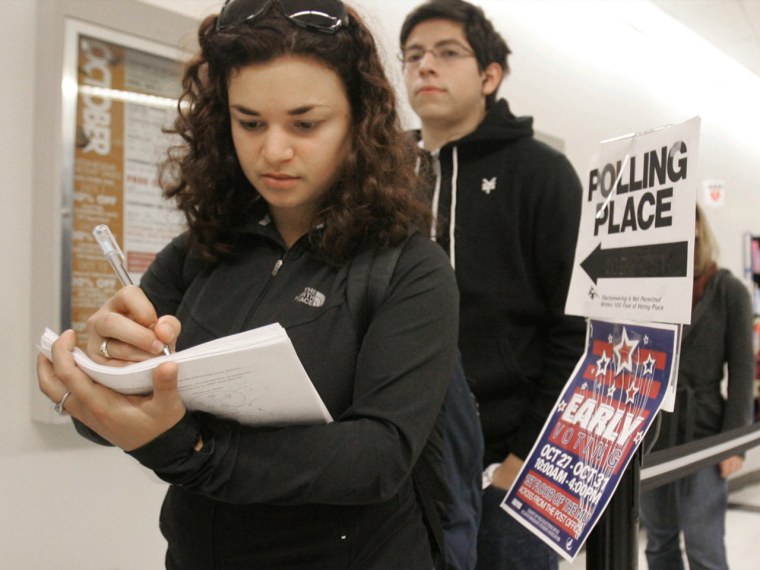A record number of young people turned out in 2008 to vote for then-Sen. Barack Obama, and this year, that voting bloc could make all the difference.
Writing for CNN Opinion earlier this month, filmmaker and Yale Visual Law Project director Valarie Kaur quantified just how much:
Our generation now makes up 24% of the electorate and could make up the deciding vote again, but only if we make it to the polls. We are not nearly as engaged this election season as the last time around. We lag behind older voters in interest in the election and intention to vote. Only 18 percent of us under 30 are following this election closely, down from 35% four years ago. Just 63% of those of us registered say we will vote, down from 72% last time around. While these numbers hold for both young Democrats and Republicans, a dip in voter turnout is most consequential for Obama, who leads among our peers.
On Saturday, msnbc's Melissa Harris-Perry welcomed Kaur, Our Time's co-founder and president Matthew Segal, and the Roosevelt Institute's Felicia Wong to her show for a discussion about the enthusiasm gap among 2012's youth voters.
"Frankly, my biggest frustration with this campaign is the absence of high idealism," Segal said.
He noted that both presidential campaigns - that of President Obama and Republican nominee Mitt Romney - have focused on the issues that differentiate the two candidates rather than discussing with voters what they will do in the next four years to create change.
Kaur echoed Segal's criticism about the lackluster debates that dominated the political conversation this year.
"We want leaders who are connected with issues that we care about," she said. "What we saw in our political discourse this election season is that, too often, our candidates missed opportunities to talk about our staggering student debt, the environment, the dignity of immigrants, civil liberties. We see these issues deeply bound up in one another." In the discussion, Melissa noted an excerpt from Kaur's essay which echoed that point:
Among my own Millennial friends, we don't debate economic reform without addressing the immigrant labor force. We never discuss health care without also grappling with women's rights. And yet, the candidates Wednesday night managed to debate fine points of policy while missing the big picture. We can't build a moral economy or health care system without considering the major social challenges of our time: civil liberties, immigration, women's rights, domestic extremism and climate change.
With a bickering and unproductive Congress, is it surprising that Millennials feel disconnected from politics?
"This is a values-driven generation, but also a really practical generation," Wong said. "They want solutions that they can invent, that they can bring into their communities."
She added that Millennials are concerned with engagement, and the nature of politics these days lack engagement for the youth. "This isn't the 'talking points' generation," Wong said.
With the election just little over one week away, the effort to get Millennials out to vote is becoming increasingly important, especially with such a close race according to latest polls.
Four years ago, the Millennial vote made a huge difference for Obama, but, as Kaur pointed out during Saturday's show, there was little effort to keep the youth base mobilized for the president after he secured re-election.
"This generation was a generation that came of age in the shadow of catastrophe," she said. "In the 2008 election, President Obama captured our diversity in his being and in his breath, and organizing for him felt like a social movement. It felt like the ushering in of a new era of our history...Four years later, it's no surprise the president is now distanced, now removed."
Watch the second half of Melissa's conversation about the Millennial vote below.
Visit NBCNews.com for breaking news, world news, and news about the economy
